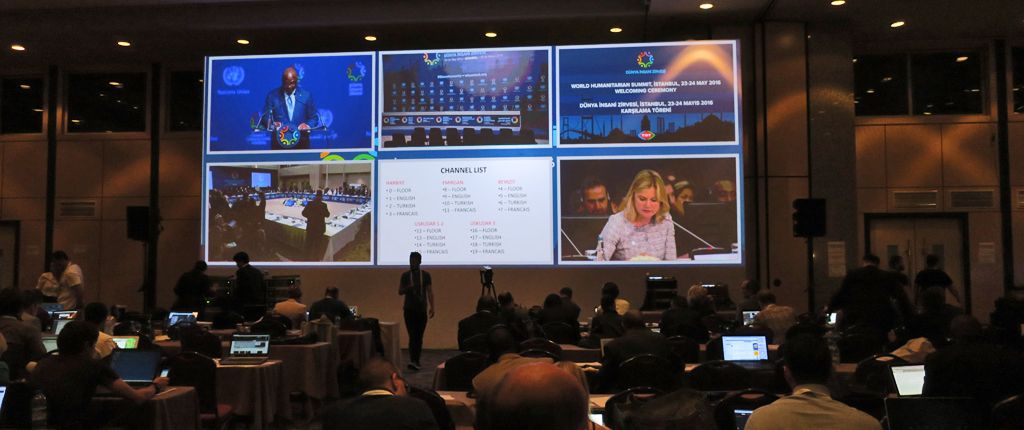
How Malteser International has used the summit to improve its own aid
On the initiative of the United Nations, more than 9,000 representatives of states, humanitarian organizations, the civil society, and the private sector met in Istanbul on May 23 and 24, 2016. Their goal: to strengthen and further develop international humanitarian aid. A key outcome of the World Humanitarian Summit was a 'Grand Bargain' between major donors and humanitarian organizations to increase the effectiveness and efficiency of humanitarian aid, getting more means into the hands of people in need. The Grand Bargain sets out 51 commitments distilled in 9 thematic work streams. See what progress we have made in delivering the promises we have made for better humanitarian assistance.
Objectives of the Grand Bargain and implementation by Malteser International
1. More transparency:
Malteser International works according to clear quality guidelines and operational standards. It is very important to us to handle donations and public funds in a documented and transparent way. We are certified by Deutscher Spendenrat and work according to the strict guidelines of our public donors, which is visibly accounted for by our certified partnership with the European Community Humanitarian Aid Office (ECHO) and the European Commission. At the beginning of 2021, we also successfully passed a quality audit conducted by the German Federal Foreign Office. More information on the standards of our aid.
2. More support and funding tools for local and national responders:
In Istanbul, public donors and aid agencies had committed to providing a quarter of their aid through local actors and partner organizations by 2020. Our experience shows that local actors can do more: at Malteser International, local partners shaped about half of the assistance in 2020. Together with Caritas, Diakonie, and Welthungerhilfe, we support 40 local partner organizations in eight countries in a particularly targeted way in building capacities and representing their interests as part of our “ToGETHER!” program.
3. Increase the use and coordination of cash-based programming:
Cash transfers are considered the best aid measure in countries with functioning markets. They enhance the dignity and the ability to act of those affected, who can decide for themselves what they need most. This way, the aid is often more need-based and targeted than standardized aid deliveries. In 2020, around 55,000 people worldwide benefited from cash assistance as part of our Covid-19-related aid alone.
4. Reducing management costs:
Since 2018, Malteser International has been testing a new funding format in the Africa region together with the German Federal Foreign Office. The goals are more flexibility, planning certainty, a better ability to respond, and less administration in humanitarian aid. The experiences have been good: in the case of a crisis, funds can now be appropriated or reallocated quickly and without the need for time-consuming coordination or application processes between partners. Regular meetings ensure the necessary exchange of information and the overall coordination.
5. Improve Joint and Impartial Needs Assessments:
In 2019, while revising our internal regulations for quality and accountability, we also streamlined the standards for identifying needs in crisis situations. Specifically, we conduct needs assessments with the local population in an unbiased and participatory manner. We also seek to assess the needs together with other humanitarian organizations to pool expertise and avoid a duplication of activities.
6. A Participation Revolution: include people receiving aid in making the decisions which affect their lives
We have refined our participatory approaches. Since 2017, we have for instance been working according to the People First Impact Method (P-FIM). This particular method allows our potential beneficiaries to freely sort out whether they need help, what they need help with and in what way, and how they want to resolve the emergency situation. As an aid organization, we explicitly do not specify any objectives. Together, we work out what knowledge, resources, and capacities are available locally and what would need to be added.
7. and 8. Increase collaborative humanitarian multi-year planning and funding & Reduce the earmarking of donor contributions:
In the regional program for Africa, the pilot project with the Foreign Office, transnational and sectoral points of focus are defined, replacing the traditional project conception, which was limited to one country and specific sectors. This enables us to provide aid more flexibly where it is needed most. Furthermore, simplified follow-up funding for ongoing crises increases the planning certainty of the aid.
9. Harmonise and simplify reporting requirements:
The donors’ complex and varying reporting requirements have increased the administrative workload of aid organizations for decades. Some points, like for example the option to hand in reports in English or to fund programs, are already contributing to a simplification of processes. However, there is still a lot of room for a further harmonization in donor requirements.
Cross-cutting issue “humanitarian-development-peace nexus”: Enhance engagement between humanitarian and development actors
For more than 20 years, Malteser International has been working with great experience in the transition area between humanitarian aid and longer-term development. More and more global humanitarian crises are caused by armed conflicts and lead to flight and displacement. Here, we strengthen our peace-building commitment, like for example with our reconstruction program for the returning population in Iraq since 2018.








